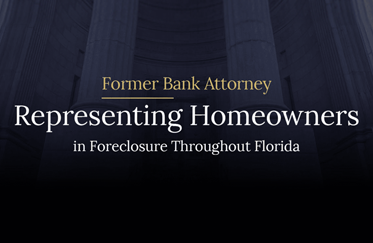After your property (or that of a deceased loved one) has sold at a County Foreclosure auction, there may be Surplus Funds remaining. This means that the property sold at the auction for more than what was owed to the plaintiff in the case. Often this is the bank that is foreclosing, but sometimes it is from the Homeowner’s or Condo-owner’s Association. Either way, if their final judgment was paid off and there are additional funds being held by the Clerk of Court, who is entitled to those Florida Foreclosure Sale Surplus Funds?
To start with, we have to look to Florida Statute 45.033(1), which states, “There is established a rebuttable presumption that the owner of record of real property on the date of the filing of a lis pendens is the person entitled to surplus funds after payment of subordinate lienholders who have timely filed a claim.” This means that the person who owned the property when the Florida Foreclosure case was filed is the person who should receive the remaining surplus funds, after any subordinate (junior) lienholders have timely made a claim. But what is the former owner of the property is deceased? Then his/her heirs would be entitled to those Florida Foreclosure Sale Surplus Funds.
Florida Statute 45.033(2)(b) states in relevant part, “An involuntary transfer or assignment may be as a result of inheritance.” This means that if your parent or other direct relative recently passed away and their property was foreclosed on leaving some Florida Foreclosure Sale Surplus Funds, you may be entitled to some or all of those funds, after any subordinate lienholders have made a timely claim. Often, because of this “involuntary transfer” as an heir to the deceased party, a probate won’t be necessary. Sometimes it is enough to submit a properly filed Motion for Surplus Funds to the court in order for you to receive the funds from the Clerk of Court. However, there are some county courts that may require certain affidavits and documentation proving how you are related to the deceased party. Additionally, depending on the specific circumstances you may be required to file a probate for the estate in order for the court to determine who is actually an heir and who is entitled to those funds. This may be especially true if the deceased party left a Will.
What about the Subordinate or Junior lienholders? Florida Statute 45.032(1)(b) defines a Subordinate Lienholder as, “the holder of a subordinate lien shown on the face of the pleadings as an encumbrance on the property. A subordinate lienholder includes, but is not limited to, a subordinate mortgage, judgment, tax warrant, assessment lien, or construction lien.” And “subordinate” is defined as “lower in rank or position.” Florida Statute 713.07(1) states that liens, “shall attach at the time of recordation of the claim of lien and shall take priority as of that time.” Please keep in mind that, in general, the highest priority lien is that of a purchase money mortgage. This means that if the homeowner’s association or condo-owner’s association is the one who forecloses on the property, then mortgage holder is NOT a subordinate lienholder and therefore is not entitled to any of the Florida Foreclosure Sale Surplus Funds and can still file its own foreclosure action on the property that has already been foreclosed on by the association.
This means that any person or entity that purchased the property at the association’s foreclosure auction, bought the property subject to the mortgage that is still attached and will be extremely surprised when the property is subsequently foreclosed on again. I have actually seen two different foreclosure auctions on the same property where the property was sold at auction both times, only a month apart.
Lastly, this person who purchased the property at the auction (third-party purchaser) is not entitled in any way to any of the Florida Foreclosure Sale Surplus Funds. This is because they are neither the owner at the time of the foreclosure action began, nor are they a subordinate lienholder. The courts have repeatedly stated that there is no mechanism by statute or caselaw that allows for a third-party purchaser to retrieve the surplus funds. It doesn’t matter if the former owner or their heirs or any subordinate lienholders don’t make a claim for the funds. If the funds are not claimed by one of these parties, the funds will escheat to the State of Florida’s Unclaimed Funds with the Department of Treasury and will be used to help fund our school system.
If you or a deceased family member lost your property to foreclosure auction anywhere in the State of Florida and you believe there are Surplus Funds remaining, please give me a call for a free consultation. I will discuss with you the best way to help retrieve those funds. I handle Foreclosure Sale Surplus Funds and Tax Deed Sale Surplus Funds in every County in the State of Florida, and I don’t get paid unless you do.

